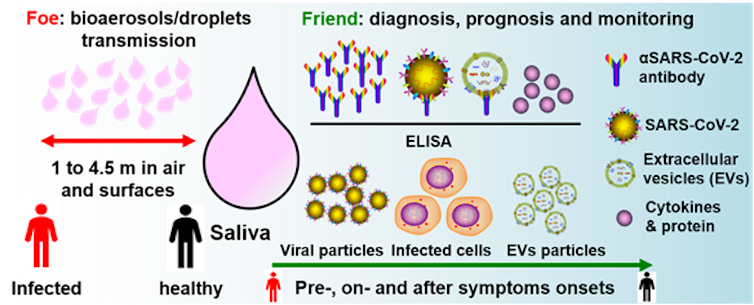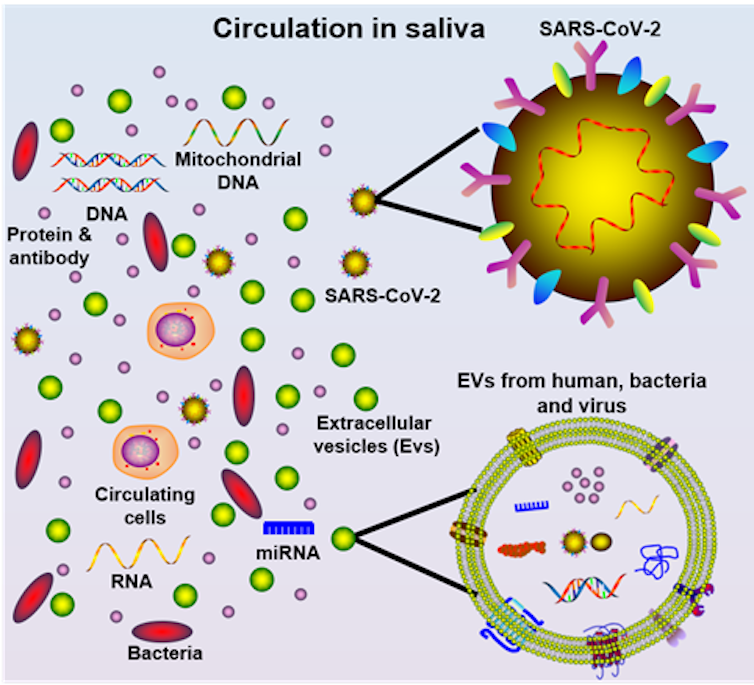Keep your nose out of it: why saliva tests could offer a better alternative to nasal COVID-19 swabs
- Written by Pingping Han, Postdoctoral Research Fellow, The University of Queensland
Saliva is one of our biggest foes in the COVID-19 pandemic, because of its role in spreading the virus. But it could be our friend too, because it potentially offers a way to diagnose the disease without using invasive nasal swabs.
Our research review, published in the journal Diagnostics, suggests saliva could offer a readily accessible diagnostic tool for detecting the presence of SARS-CoV-2, the virus that causes COVID-19, and might even be able to reveal whether someone’s immune system has already encountered it.
COVID-19 testing is a crucial part of the pandemic response, especially now countries are gradually lifting social distancing restrictions. This requires widespread, early, accurate and sensitive diagnosis of infected people, both with and without symptoms.
Our review looked at the results of three different studies, in Hong Kong, the nearby Chinese mainland city of Shenzhen, and Italy. All three studies found SARS-CoV-2 is indeed present in the saliva of COVID-19 patients (at rates of 87%, 91.6%, and 100% of patients, respectively). This suggests saliva is a potentially very useful source of specimens for detecting the virus.
Read more: The positives and negatives of mass testing for coronavirus
Saliva spreads the SARS-CoV-2 virus via breathing, coughing, sneezing, and conversation, which is why guidelines suggest we maintain a distance of at least 1.5 metres from one another. We also know SARS-CoV-2 can survive in tiny droplets of saliva in an experimental setting.
 Author provided
Saliva is an attractive option for detecting SARS-CoV-2, compared with the current tests which involve taking swabs of mucus from the upper respiratory tract. Saliva is easy to access, which potentially makes the tests cheaper and less invasive. Saliva can hold up a mirror to our health, not just of our mouth but our whole body.
For this reason, saliva has already been widely investigated as a diagnostic tool for chronic systemic diseases, as well as for oral ailments such as periodontal disease and oral cancers. But less attention has been given to its potential usefulness in acute infectious diseases such as COVID-19, perhaps because researchers and clinicians don’t yet appreciate its full potential.
What a mouthful
When we get sick, much of the evidence is present in our saliva – from the germs themselves, to the antibodies and immune system proteins we use to fight them off. Saliva also contains genetic material and other cellular components of pathogens after we have broken them down (for the full biochemical breakdown of the weird and wonderful things in our saliva, see pages 51-61 of our review).
Author provided
Saliva is an attractive option for detecting SARS-CoV-2, compared with the current tests which involve taking swabs of mucus from the upper respiratory tract. Saliva is easy to access, which potentially makes the tests cheaper and less invasive. Saliva can hold up a mirror to our health, not just of our mouth but our whole body.
For this reason, saliva has already been widely investigated as a diagnostic tool for chronic systemic diseases, as well as for oral ailments such as periodontal disease and oral cancers. But less attention has been given to its potential usefulness in acute infectious diseases such as COVID-19, perhaps because researchers and clinicians don’t yet appreciate its full potential.
What a mouthful
When we get sick, much of the evidence is present in our saliva – from the germs themselves, to the antibodies and immune system proteins we use to fight them off. Saliva also contains genetic material and other cellular components of pathogens after we have broken them down (for the full biochemical breakdown of the weird and wonderful things in our saliva, see pages 51-61 of our review).
 Author provided
Saliva is also hardy. It can be stored at –80℃ for several years with little degradation.
This means it would be relatively straightforward to track the progression of COVID-19 in individual patients, by collecting saliva at various times during the disease and recovery. Saliva tests from recovered patients could also tell us if they have encountered the disease for a second time, and how strong their immune response is.
However, there is no research yet available on using saliva to monitor immune responses. This will be well worth investigating, given the pressing need for a reliable and cost-effective way to monitor the population for immunity to COVID-19 as the outbreak continues.
Could saliva testing replace nasal swabs?
An ideal saliva test would be a disposable, off-the-shelf device that could be used at home by individuals, without exposing them or others to the risk of visiting a clinic.
One drawback with the research so far is that it has involved small numbers of patients (each of the three studies we reviewed involved no more than 25 people), and there is little published detail on exactly how these studies collected the saliva – whether from the mouth or throat, whether by spitting, drooling or swabbing, and whether collected by the patient or by a clinician.
Nevertheless, based on the modest amount of research done so far, saliva looks like a promising candidate for COVID-19 testing. More research is now needed, in larger groups of people, to learn more about how to confidently test for SARS-CoV-2 in the saliva of both symptomatic and non-symptomatic people.
Read more:
Curious Kids: why do we make saliva?
Earlier this month the US Food and Drug Administration approved the sale of saliva-based COVID-19 test kits that will allow people to collect their own samples and send them to a lab for analysis.
A reliable test would offer a cheaper, less invasive and potentially even more accurate way to detect the virus, which would also reduce the risk posed by routine COVID-19 checks to both patients and front-line medical professionals.
Author provided
Saliva is also hardy. It can be stored at –80℃ for several years with little degradation.
This means it would be relatively straightforward to track the progression of COVID-19 in individual patients, by collecting saliva at various times during the disease and recovery. Saliva tests from recovered patients could also tell us if they have encountered the disease for a second time, and how strong their immune response is.
However, there is no research yet available on using saliva to monitor immune responses. This will be well worth investigating, given the pressing need for a reliable and cost-effective way to monitor the population for immunity to COVID-19 as the outbreak continues.
Could saliva testing replace nasal swabs?
An ideal saliva test would be a disposable, off-the-shelf device that could be used at home by individuals, without exposing them or others to the risk of visiting a clinic.
One drawback with the research so far is that it has involved small numbers of patients (each of the three studies we reviewed involved no more than 25 people), and there is little published detail on exactly how these studies collected the saliva – whether from the mouth or throat, whether by spitting, drooling or swabbing, and whether collected by the patient or by a clinician.
Nevertheless, based on the modest amount of research done so far, saliva looks like a promising candidate for COVID-19 testing. More research is now needed, in larger groups of people, to learn more about how to confidently test for SARS-CoV-2 in the saliva of both symptomatic and non-symptomatic people.
Read more:
Curious Kids: why do we make saliva?
Earlier this month the US Food and Drug Administration approved the sale of saliva-based COVID-19 test kits that will allow people to collect their own samples and send them to a lab for analysis.
A reliable test would offer a cheaper, less invasive and potentially even more accurate way to detect the virus, which would also reduce the risk posed by routine COVID-19 checks to both patients and front-line medical professionals.
Authors: Pingping Han, Postdoctoral Research Fellow, The University of Queensland



